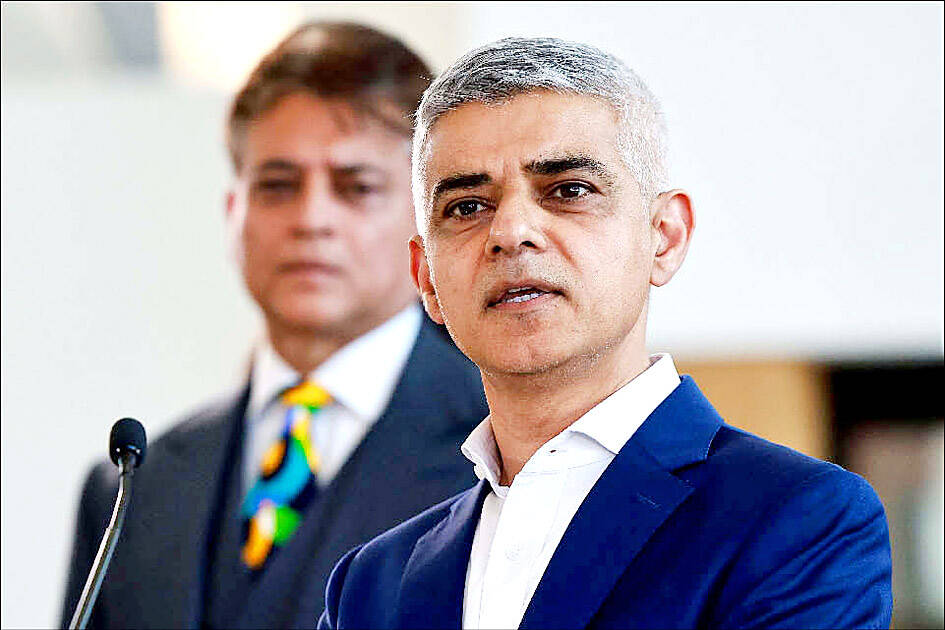Britain’s Labour Party on Saturday won mayoral polls in London and central England, in crushing defeats for British Prime Minister Rishi Sunak’s unpopular Conservatives ahead of a national election due later this year.
While Labour politician Sadiq Khan’s re-election as London mayor was widely expected, Labour also snatched a surprise, narrow victory in the central West Midlands region that is home to Britain’s second-largest city of Birmingham.
The wins are Labour’s latest in local elections to councils and mayoralties on Thursday and could fuel fresh calls for Sunak to step down.

Photo: AFP
Opinion polls predicted that Labour would win the next national election, propelling party leader Keir Starmer to power and ending 14 years of Conservative government.
Sunak has said he intends to call a vote in the second half of this year.
Conservative West Midlands Mayor Andy Street lost to his Labour opponent Richard Parker. Street’s 37.5 percent of the vote was eclipsed by 37.8 percent for Parker, a razor-thin margin translating to 1,508 votes.
Street, who has served as mayor since 2017, ran a campaign emphasizing his personal record on investment, while downplaying his Conservative affiliation. He publicly disputed Sunak’s decision to scrap the high-speed HS2 rail link from Birmingham to Manchester last year.
Khan’s victory in London, his third in a row, came despite some public anger over knife crime and the Ultra Low Emission Zone that charges drivers of older, more polluting vehicles a daily fee.
“It’s been a difficult few months, we faced a campaign of nonstop negativity,” Khan said in a speech after the results showed he had won 43.8 percent of the vote against 33 percent for the Conservatives’ candidate, Susan Hall.
“For the last eight years, London has been swimming against the tide of a Tory [Conservative] government and now with a Labour Party that’s ready to govern again under Keir Starmer, it’s time for Rishi Sunak to give the public a choice,” he said.
Khan, 53, became the first Muslim mayor of the British capital in 2016.

Airlines in Australia, Hong Kong, India, Malaysia and Singapore yesterday canceled flights to and from the Indonesian island of Bali, after a nearby volcano catapulted an ash tower into the sky. Australia’s Jetstar, Qantas and Virgin Australia all grounded flights after Mount Lewotobi Laki-Laki on Flores island spewed a 9km tower a day earlier. Malaysia Airlines, AirAsia, India’s IndiGo and Singapore’s Scoot also listed flights as canceled. “Volcanic ash poses a significant threat to safe operations of the aircraft in the vicinity of volcanic clouds,” AirAsia said as it announced several cancelations. Multiple eruptions from the 1,703m twin-peaked volcano in

A plane bringing Israeli soccer supporters home from Amsterdam landed at Israel’s Ben Gurion airport on Friday after a night of violence that Israeli and Dutch officials condemned as “anti-Semitic.” Dutch police said 62 arrests were made in connection with the violence, which erupted after a UEFA Europa League soccer tie between Amsterdam club Ajax and Maccabi Tel Aviv. Israeli flag carrier El Al said it was sending six planes to the Netherlands to bring the fans home, after the first flight carrying evacuees landed on Friday afternoon, the Israeli Airports Authority said. Israeli Prime Minister Benjamin Netanyahu also ordered

Former US House of Representatives speaker Nancy Pelosi said if US President Joe Biden had ended his re-election bid sooner, the Democratic Party could have held a competitive nominating process to choose his replacement. “Had the president gotten out sooner, there may have been other candidates in the race,” Pelosi said in an interview on Thursday published by the New York Times the next day. “The anticipation was that, if the president were to step aside, that there would be an open primary,” she said. Pelosi said she thought the Democratic candidate, US Vice President Kamala Harris, “would have done

Farmer Liu Bingyong used to make a tidy profit selling milk but is now leaking cash — hit by a dairy sector crisis that embodies several of China’s economic woes. Milk is not a traditional mainstay of Chinese diets, but the Chinese government has long pushed people to drink more, citing its health benefits. The country has expanded its dairy production capacity and imported vast numbers of cattle in recent years as Beijing pursues food self-sufficiency. However, chronically low consumption has left the market sloshing with unwanted milk — driving down prices and pushing farmers to the brink — while